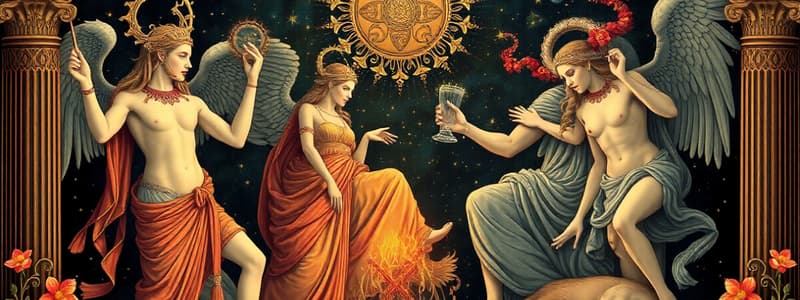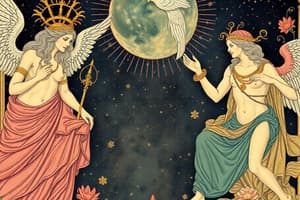Podcast
Questions and Answers
Which Olympian god is recognized as the messenger of the gods?
Which Olympian god is recognized as the messenger of the gods?
- Ares
- Hades
- Apollo
- Hermes (correct)
What key role did Greek mythology play in ancient Greek society?
What key role did Greek mythology play in ancient Greek society?
- It served as a historical account of events.
- It functioned solely as entertainment.
- It was primarily focused on political teachings.
- It provided explanations for natural phenomena and human behavior. (correct)
Which of the following is NOT a characteristic commonly attributed to Greek gods?
Which of the following is NOT a characteristic commonly attributed to Greek gods?
- Intervening in human affairs
- Having control over specific life aspects
- Exhibiting human emotions
- Being perfect and benevolent (correct)
Which hero is known for performing extraordinary deeds and has divine parentage?
Which hero is known for performing extraordinary deeds and has divine parentage?
What is a common theme explored in Greek mythology?
What is a common theme explored in Greek mythology?
Which of the following creatures is recognized as a mythical being in Greek mythology?
Which of the following creatures is recognized as a mythical being in Greek mythology?
From what did the universe emerge according to Greek creation myths?
From what did the universe emerge according to Greek creation myths?
Which goddess is associated with wisdom in Greek mythology?
Which goddess is associated with wisdom in Greek mythology?
Flashcards
Olympian Gods
Olympian Gods
The most important gods in Greek mythology, who lived on Mount Olympus and controlled various aspects of life.
Greek Mythology
Greek Mythology
Stories about Greek gods, heroes, and creatures that explained the world, people and their origins.
Greek Heroes
Greek Heroes
Famous figures in Greek stories who performed great deeds and battles, often with divine connections.
Creation Myths
Creation Myths
Signup and view all the flashcards
Mythological Creatures
Mythological Creatures
Signup and view all the flashcards
Divine Intervention
Divine Intervention
Signup and view all the flashcards
Mythological Cycles
Mythological Cycles
Signup and view all the flashcards
Western Culture Influence
Western Culture Influence
Signup and view all the flashcards
Study Notes
- Greek mythology is a body of stories about gods, heroes, and mythical creatures of ancient Greece. These stories were important in ancient Greek society, as they explained the natural world, human behavior, and the origins of the world.
Olympian Gods
- The Olympian gods were the most important deities in Greek mythology.
- They lived on Mount Olympus and were believed to have control over various aspects of life.
- Key Olympian gods include Zeus (king of the gods), Hera (queen of the gods), Poseidon (god of the sea), Hades (god of the underworld), Demeter (goddess of agriculture), Hestia (goddess of the hearth), Athena (goddess of wisdom), Apollo (god of music, poetry, and medicine), Artemis (goddess of the hunt), Ares (god of war), Aphrodite (goddess of love), and Hermes (messenger god).
Other Important Deities
- Greek mythology contained many other important deities, including nymphs, satyrs, and lesser gods associated with specific places or activities.
- These include various lesser gods and goddesses, nature spirits, and monsters.
Heroes
- Greek mythology also features numerous heroes, who often performed extraordinary deeds and battles.
- Examples include Heracles (Hercules), Theseus, Odysseus, and Perseus.
- These heroes often had divine parentage or demonstrated extraordinary bravery and strength.
Creation Myths
- Greek mythology includes creation myths that describe the origins of the world, human beings, and other elements of reality.
- These myths often have different variations, but generally depict the universe as emerging from chaos or a primordial being.
Other Mythological Beings
- There were various other creatures, such as monsters, mythical animals, and creatures of great power.
- These include mythical beasts like the Hydra, Cerberus, and the Sphinx, among others.
- They served as archetypes, figures of fear and danger, or even as symbols of particular qualities.
Characteristics of Greek Gods
- The gods were not always perfect or benevolent.
- They frequently exhibited human emotions, like envy, anger, or love.
- They also intervened in human affairs, often in unpredictable ways.
Mythological Cycles
- Greek myths often involve a cyclical pattern, with stories repeated and retold across generations.
- The stories often deal with themes of fate, destiny, or the consequences of human actions.
Influence on Western Culture
- Greek mythology has had a major influence on Western culture.
- Its stories and characters are frequently referenced in literature, art, and popular culture.
- Modern artists and writers draw from Greek mythology to create works on various topics.
Studying That Suits You
Use AI to generate personalized quizzes and flashcards to suit your learning preferences.




